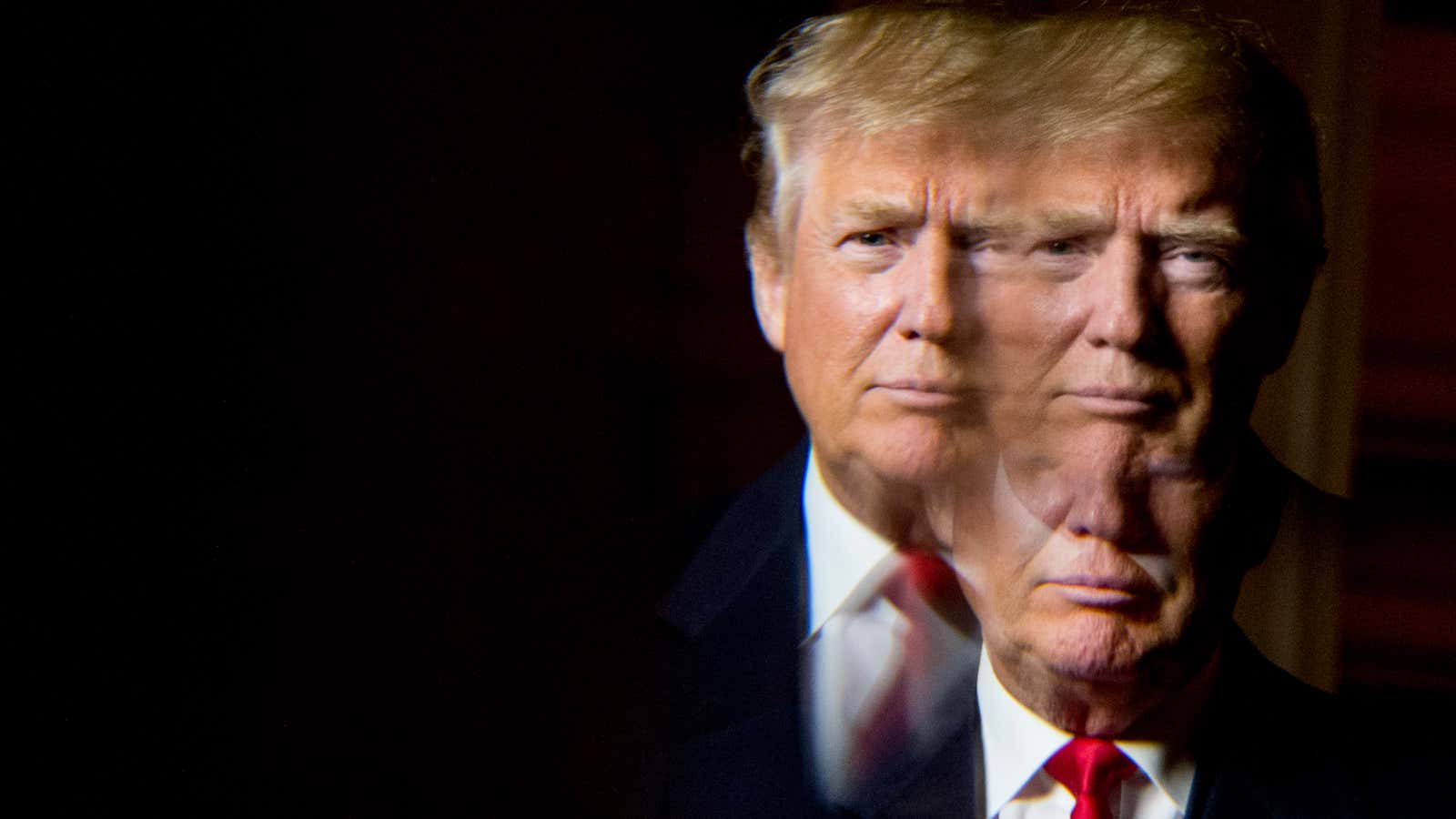A major theme of the US presidential election has centered around the language of inclusivity and exclusivity. With so many demographics on both sides of the political spectrum feeling isolated and in need of a leader, Americans—and all global citizens—need now more than ever to create some notion of a collective identity. And that identity can be both formed and enforced through language.
President-elect Donald Trump’s campaign rhetoric championed an us-versus-them mentality, and his syntax revealed a monocratic point of view. “I alone can fix it,” he infamously quipped, implying that America’s problems could only be solved through autocracy, not cooperation.
But in Trump’s victory speech early on the morning of Nov. 9, his linguistic patterns were in stark contrast to the me-me-me approach he’s taken through much of the election. Suddenly, it was we-we-we. Thirty of them, in fact.
Take this quote about Trump’s (errant) economic plan as an example: “We have a great economic plan. We will double our growth and have the strongest economy anywhere in the world. At the same time, we will get along with all other nations willing to get along with us. We will be. We will have great relationships. We expect to have great, great relationships.” The language tics are undeniably Trumpian, yes—but the emphatic use of the pronoun we at least signals unity. In previous speeches, you would have figured Trump to use the singular pronoun I, denoting personal opinions and dictatorial assertions.
“This repeated use of ‘we will’ accomplishes two important goals,” says Christian Lundberg, an associate professor of rhetoric at the University of North Carolina–Chapel Hill. “First, it’s a departure from Trump’s usual tone, moving from the self-focused ‘I’ of the campaign trail to the broader idea of ‘we’ the nation. Second, the it changes the tone of the speech from candidate Trump’s negative claims of an America under threat toward a tone that is aspirational, even hopeful.” In other words, the way something is said can be just as important, if not more, than what is actually said.
Grammar is the mortar to meaning’s bricks. When manipulated, it can change the connotation of a string of nouns, adjectives, and verbs, as well as the sense of agency they provoke. For example, how someone uses pronouns—the words that represent the participants in a conversation—can indicate a speaker’s underlying meaning. The first-person singular (“I will make this country great again”) is authoritative and agenda-setting, whereas the first-person plural (“We will make this country great again”) acts more as a collective call-to-arms. The second person (“You will make this country great again”) works as an imperative that imbues the listener with a feeling of power, but the third-person plural (“They will make this country great again”) takes that same power away and gives it to an unseen entity.
The concept of a fear-inducing, ominous they was often pushed by Trump during his campaign, whether referencing the left-leaning cabal, undocumented immigrants, or Muslim populations. The small, syntactical minutiae in Trump’s language further supports this bias. For example, Trump’s use of the particle the when referring to minority communities—the African Americans, the Latinos, the women—paints these communities as being homogeneous instead of being made up of groups of diverse individuals.
“Trump’s the works as a dog-whistle to disaffected rural white voters attracted to his message,” says linguist Lynne Murphy. “At the very least, he is demonstrating to those voters that he is keeping other groups distanced—that, like them, he sees African-Americans and Latinos as something over there, in the inner cities (and the White House), rather than as millions of individual Americans with as much invested in the future of this country as its white citizens.”
Through his use of language, Trump positioned himself as the leader of a disenfranchised us, out to stop them by any means necessary. And perhaps this self-centered assertion was exactly what disenfranchised Americans wanted to hear.
Trump’s refusal to speak inclusively might have helped him stand apart from the establishment his followers so vehemently hated. These voters—and arguably also Bernie Sanders’s—didn’t necessarily want someone who was representative of them (as indicated by the cosmopolitan Trump’s appeal with poor, rural voters.) Instead, they were looking for a strong leader who had his own, loud opinion that was clearly separate from the monotonous political speak of the so-called liberal (and conservative) elite—no matter how little clout that opinion held.
But a democratic head of state is, by definition, meant to represent the will of the people and not his own self-interests. And so, since winning office on Nov. 8, Trump’s language seems to have begun leaning toward the inclusive language of his soon-to-be political peers. For example, Hillary Clinton’s concession speech and president Barack Obama’s comments on Trump’s election were heavy on the plural pronouns we, our, and us. “We’re not Democrats first. We’re not Republicans first,” Obama said in a White House address on Nov 10. “We are Americans first. We’re patriots first. We all want what’s best for this country.”
“Our campaign was never about one person or even one election, it was about the country we love and about building an America that’s hopeful, inclusive and big-hearted,” Clinton said. “Let us have faith in each other, let us not grow weary, let us not lose heart, for there are more seasons to come.”
Trump’s rhetoric in his victory speech gives me hope that even if his policies are found lacking, he will at the very least speak the language of inclusion that we so dearly need to hear right now. By pledging to represent all Americans—while still acknowledging their diverse interests—Trump might be able to begin healing some of the damage he has done to the American identity.
His actions will speak louder than his words, but the latter is a good start.
